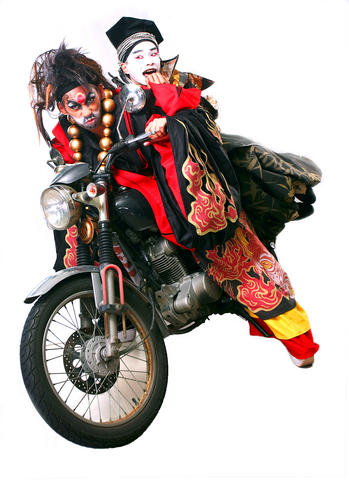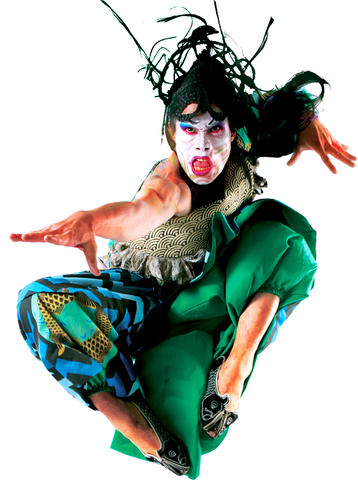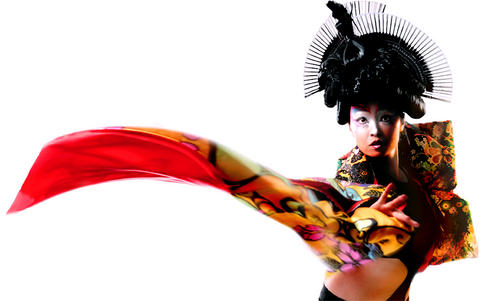Contemporary Legend Theater (當代傳奇劇場, CLT), under the direction of Beijing opera innovator Wu Hsing-kuo (吳興國), has, since its inception, taken a bold path in its efforts to give the centuries-old Chinese artistic tradition relevance to the modern world. 108 Heroes (水滸108) is its most ambitious project to date, potentially part of a three-part series which aims to radically reinterpret the Chinese classic novel Water Margin (水滸傳), also widely known as Outlaws of the Marsh and All Men Are Brothers in various English editions.
To achieve this goal, CLT has drawn on a powerhouse of talent, most notably contemporary novelist and literary figure Chang Ta-chun (張大春), who wrote the script, and pop idol and composer Emil Chow (周華健), who contributed contemporary music and songs, in addition to Wu himself. That these three names should appear together is remarkable in itself, for the worlds of high-brow contemporary literature, pop music and Beijing opera would seem unlikely bedfellows. Whether the CLT team has managed to bring these worlds together into a single unified production remains to be seen, for the work was still undergoing fine tuning this week prior to its world premiere at Taipei's Metropolitan Hall tonight.
The novel, of uncertain authorship and with many versions, came into wide circulation in the 14th century and tells the story of a band of outlaws who were active in the early 12th century during the Song Dynasty. It is very much a boy's book about honor among sworn brothers and the nature of justice in a corrupt world. It contains an interminable series of violent encounters between various characters, often for the most trivial reasons (slighted honor or excessive drinking), and in many respects is the ancient equivalent of the First-Person Shooter of today. It is also notorious for its appalling treatment of its female characters, when it can be bothered with the doings of women at all.

PHOTO: COURTESY OF CONTEMPORARY LEGEND THEATER
Sections of this massive novel have been adapted through the ages for opera, but 108 Heroes makes a radical revision of even some basic elements of the story to make it more relevant and interesting for a contemporary audience. Most notably, the roles of female characters have been expanded, in some cases drawing on other related source materials.
Moreover, Wu has brought in five aspiring opera performers to play a multiplicity of roles that the show demands. This is something of a Wu specialty, showcased most notably in his adaptation of King Lear, in which he played all the roles himself. These performers, though only in their early 20s have over a decade of experience behind them already (opera training starts young), are pushed to the limit. "This is for their benefit," Wu said. "The thing performers lack most these days is stage experience." Wu's direction has allowed them the space to present their own perspectives and personalities, giving this opera a youthful edginess that is new to CLT, which has usually had Wu as the focus of major shows.
Wu, who has made a career of reinterpreting classic Western works such as Macbeth and The Tempest for modern audiences using the forms of traditional Chinese opera, says that staying relevant and retaining audiences has always been at the heart of his endeavor. "I was forced into doing Western works, for only in this way could I find audiences for Chinese opera," he said of his early days as a young opera performer. These ideas where at the heart of his break from the opera establishment and the founding of CLT in 1986. "When we adapt a work, we must look at how it connects with the modern world. This is our central concern."

The idea of crossing boundaries, of mixing media, of fusing Eastern and Western forms, of bringing traditional arts in the 21st century, have all become cliches of the modern performing arts. Critics are inclined to say that what emerges is simply a hodgepodge, that by trying to be everything, it ends up being nothing. Wu, in mixing up various styles of opera, and even bringing in pop and hip-hop musical elements in his new show, believes that he manages to remain true to the essence of Chinese opera.
Commenting specifically on the mix of various opera styles, Chang said: "Let's look at American music, the period when jazz was developing. I think that what Wu is doing with Chinese opera is similar to the situation of when jazz was emerging. All sorts of music, such as gospel, soul, blues were mixed up together. This is the same sort of thing."


The canonical shot of an East Asian city is a night skyline studded with towering apartment and office buildings, bright with neon and plastic signage, a landscape of energy and modernity. Another classic image is the same city seen from above, in which identical apartment towers march across the city, spilling out over nearby geography, like stylized soldiers colonizing new territory in a board game. Densely populated dynamic conurbations of money, technological innovation and convenience, it is hard to see the cities of East Asia as what they truly are: necropolises. Why is this? The East Asian development model, with

June 16 to June 22 The following flyer appeared on the streets of Hsinchu on June 12, 1895: “Taipei has already fallen to the Japanese barbarians, who have brought great misery to our land and people. We heard that the Japanese occupiers will tax our gardens, our houses, our bodies, and even our chickens, dogs, cows and pigs. They wear their hair wild, carve their teeth, tattoo their foreheads, wear strange clothes and speak a strange language. How can we be ruled by such people?” Posted by civilian militia leader Wu Tang-hsing (吳湯興), it was a call to arms to retake

This is a deeply unsettling period in Taiwan. Uncertainties are everywhere while everyone waits for a small army of other shoes to drop on nearly every front. During challenging times, interesting political changes can happen, yet all three major political parties are beset with scandals, strife and self-inflicted wounds. As the ruling party, the Democratic Progressive Party (DPP) is held accountable for not only the challenges to the party, but also the nation. Taiwan is geopolitically and economically under threat. Domestically, the administration is under siege by the opposition-controlled legislature and growing discontent with what opponents characterize as arrogant, autocratic

When Lisa, 20, laces into her ultra-high heels for her shift at a strip club in Ukraine’s Kharkiv, she knows that aside from dancing, she will have to comfort traumatized soldiers. Since Russia’s 2022 invasion, exhausted troops are the main clientele of the Flash Dancers club in the center of the northeastern city, just 20 kilometers from Russian forces. For some customers, it provides an “escape” from the war, said Valerya Zavatska — a 25-year-old law graduate who runs the club with her mother, an ex-dancer. But many are not there just for the show. They “want to talk about what hurts,” she